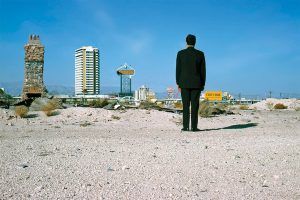From Artforum:
 My students and I were in the midst of studying Learning from Las Vegas when the news came of Robert Venturi’s death. We had just absorbed an extraordinary lecture tour of his mother’s house, in all its faux–New England simplicity, which harbored so many allusive surprises; now the book, published in 1972, was revealing itself to be a profoundly American source for the cultural-studies movement whose genealogy we had for so long attributed to the Birmingham School. It also turns out to have been one of the underground blasts that signaled the beginning of postmodernism.
My students and I were in the midst of studying Learning from Las Vegas when the news came of Robert Venturi’s death. We had just absorbed an extraordinary lecture tour of his mother’s house, in all its faux–New England simplicity, which harbored so many allusive surprises; now the book, published in 1972, was revealing itself to be a profoundly American source for the cultural-studies movement whose genealogy we had for so long attributed to the Birmingham School. It also turns out to have been one of the underground blasts that signaled the beginning of postmodernism.
The 2017 facsimile reprint of the original, with its fiery preface by his coauthor and collaborator Denise Scott Brown, reminded us that Venturi was not alone in this rediscovery of American culture in the desert, and that its vernacular was but one of two distinct languages he and Brown deployed to convey their revelations, the other being the scholarly subtlety and richly detailed historical argumentation of Venturi’s own Complexity and Contradiction in Architecture (1966): a book worthy of standing alongside so many volumes of rigorous New Critical literary analysis from the 1930s and ’40s, Venturi, here, drew on those volumes’ promotion of the irony and paradox of poetic language, prophetically modifying those terms in his title, a move that might tempt us to transform so many language games and figural antinomies back into more ominous Hegelian contradictions, while the term complexity, gradually replacing vitalism in the scientific languages to come, would grow into the buzzword of our present-day sciences (and computational practices).
More here.
